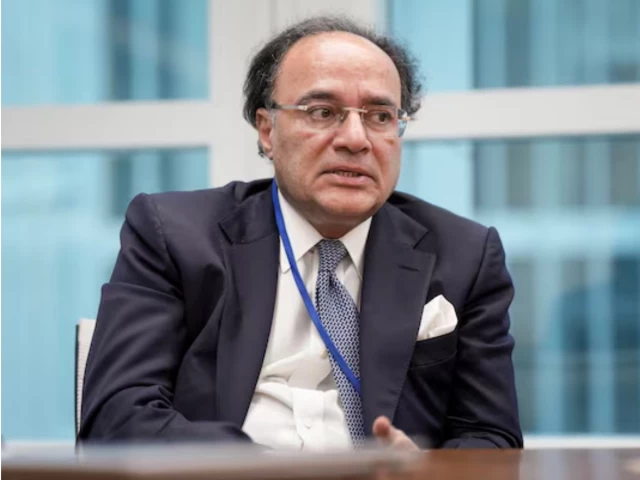Finance Minister Muhammad Aurangzeb speaks during a Reuters interview at the 2025 annual IMF/World Bank Spring Meetings in Washington, DC, US, April 25, 2025. Photo: Reuters/ File
The government of Pakistan and the International Monetary Fund (IMF) have reached a staff-level agreement on the second review under the Extended Fund Facility (EFF) and the first review under the Resilience and Sustainability Facility (RSF), the Fund announced on Tuesday.
The agreement follows discussions held from September 24 to October 8, 2025, in Karachi, Islamabad, and Washington DC, led by IMF mission chief Iva Petrova. The staff-level deal remains subject to approval by the IMF Executive Board.
Under the arrangement, Pakistan will receive $1 billion under the EFF and $200 million under the RSF, bringing total disbursements to $3.3 billion so far. The IMF and Pakistan’s Ministry of Finance confirmed the development in official statements, with the latter hailing it as a “significant milestone” for the economy.
IMF Reaches Staff-Level Agreement on the Second Review for the 37-month Extended Arrangement under the Extended Fund Facility (EFF) and the First Review for 28-month Arrangement Under the Resilience and Sustainability Facility (RSF) – Pakistan https://t.co/slbRIrVbw5
— Ministry of Finance, Government of Pakistan (@Financegovpk) October 15, 2025
What happened & why it matters
Staff-level agreement reached between Pakistan and IMF for:
Second review of 37-month Extended Fund Facility (EFF).
First review of 28-month Resilience and Sustainability Facility (RSF).
Total disbursements to Pakistan so far: $3.3 billion; $1 billion under EFF, $200 million under RSF.
Discussions held Sep 24 – Oct 8, 2025 in Karachi, Islamabad, and Washington DC, led by IMF mission chief Iva Petrova.
Agreement subject to IMF Executive Board approval.
Pakistan Stock Exchange surged nearly 2,000 points after announcement.
The deal strengthens Pakistan’s financial stability, ensures vital external financing, and signals investor confidence in the country’s economic recovery. Prime Minister Shehbaz Sharif welcomed the agreement, calling it evidence of Pakistan’s improved macroeconomic indicators and growing international confidence in its recovery trajectory.
The IMF praised Pakistan’s strong implementation of the reform agenda, highlighting the first current account surplus in 14 years (FY25), inflation under control and within the SBP’s target range, stronger external buffers, improved financial conditions, and restored market confidence with sovereign spreads narrowing.
The Fund also commended Pakistan’s commitment to fiscal discipline, energy sector reform, and support for flood victims.
The challenges ahead—Pakistan in the spotlight
Severe floods have disrupted economic momentum — affecting 7 million people, causing over 1,000 deaths, and damaging farmland and infrastructure. As a result, the IMF lowered Pakistan’s projected FY26 GDP growth to 3.25–3.5%, warning that climate vulnerability remains a major threat.
To maintain IMF support and continued disbursements, Pakistan must sustain fiscal discipline and enhance revenue collection, ensure energy sector viability through pricing and governance reforms, keep inflation within targets, and advance climate resilience reforms under the RSF.
The bottom line is that the IMF deal marks a significant vote of confidence in Pakistan’s economic recovery — but sustained reforms and climate resilience will be key to keeping the momentum.

